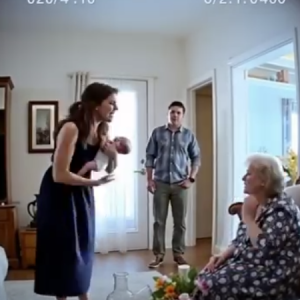When Mom fell ill, Samira swooped in like the devoted daughter, moving into Mom’s room and insisting she’d handle everything—while I was shut out. I watched her soft smile and practiced concern, but I knew her too well: her generosity always came with strings attached. I felt powerless—until the day the doctor handed me Mom’s final note.
Growing up, Samira and I were as different as two sisters could be. In our tiny, drafty apartment, Mom worked two jobs to keep us fed and warm, often skipping meals so we wouldn’t go hungry. I still remember Mrs. Jenkins from next door, quietly delivering a pot of soup or a plate of pasta, her kindness shining in those bleak years. Mom never sat with us at the table; she’d sip cold tea in silence, hiding her own hunger so we could eat first.
Over time, things improved. Mom landed a better job, we moved into a modest house, and both of us went to college. Samira, barely aware of hardship, treated Mom’s success as her personal ATM. She graduated, refused to work, and drained Mom’s savings on luxuries. I stayed away, unwilling to confront her, but always watching.
When Mom called me one evening with trembling news—her heart was failing and she had at most a year—I raced to her side. She pleaded, “Don’t tell Samira yet.” I argued that Samira would keep demanding money, but Mom insisted she’d break the news when she was ready.
A month later, Samira learned of the diagnosis and immediately barred me from visiting. She claimed Mom was resting, at the doctor, or simply not feeling up to company. I texted Mom for windows of opportunity, and when one came, I brought groceries, tea, fresh fruit—anything to remind her she wasn’t alone. Mom’s eyes lit up, but her face grew worried when she told me Samira had accused me of wanting Mom’s inheritance.
Fury and heartbreak collided in me. I went straight to Dr. Miller’s office and arranged to take over Mom’s medical bills, determined to keep her finances from Samira’s grasp. As the bills piled up, I realized how quickly savings could vanish under Samira’s care. When Mom was finally hospitalized, I claimed every evening by her bedside, reading stories, holding her hand, refusing to let Samira’s self‑interest steal another moment.
One night, Samira cornered me in the hospital hallway, her voice hushed and urgent: “Mom’s money is almost gone. I need support for groceries and utilities.” I refused to bankroll her lifestyle and walked back to Mom’s room, my resolve unshaken.
Days later, the call came: Mom had slipped away. I arrived at the hospital to find Samira already there, flanked by her lawyer, ready to claim the will. Anger flared as she announced, “Since I’ve cared for her, the inheritance is mine.” I shoved the document back and stormed out, tears blurring my vision.
Dr. Miller caught me in his office and gently offered condolences. Then he handed me an envelope in Mom’s handwriting: “For My True Daughter.” My hands trembled as I opened it to find a newer, valid will leaving everything to me, plus a secret account I’d never known existed. A final note read: “I understand who truly cares. I love you, Nicole. Keep kindness in your heart.”
Tears blurred the hospital lights as I pressed the note to my chest. Even in death, Mom had protected me. With her love and her faith in me, I vowed to honor her memory by living with the compassion and strength she taught me—knowing at last that true family is measured not by blood, but by the depth of care we give one another.





